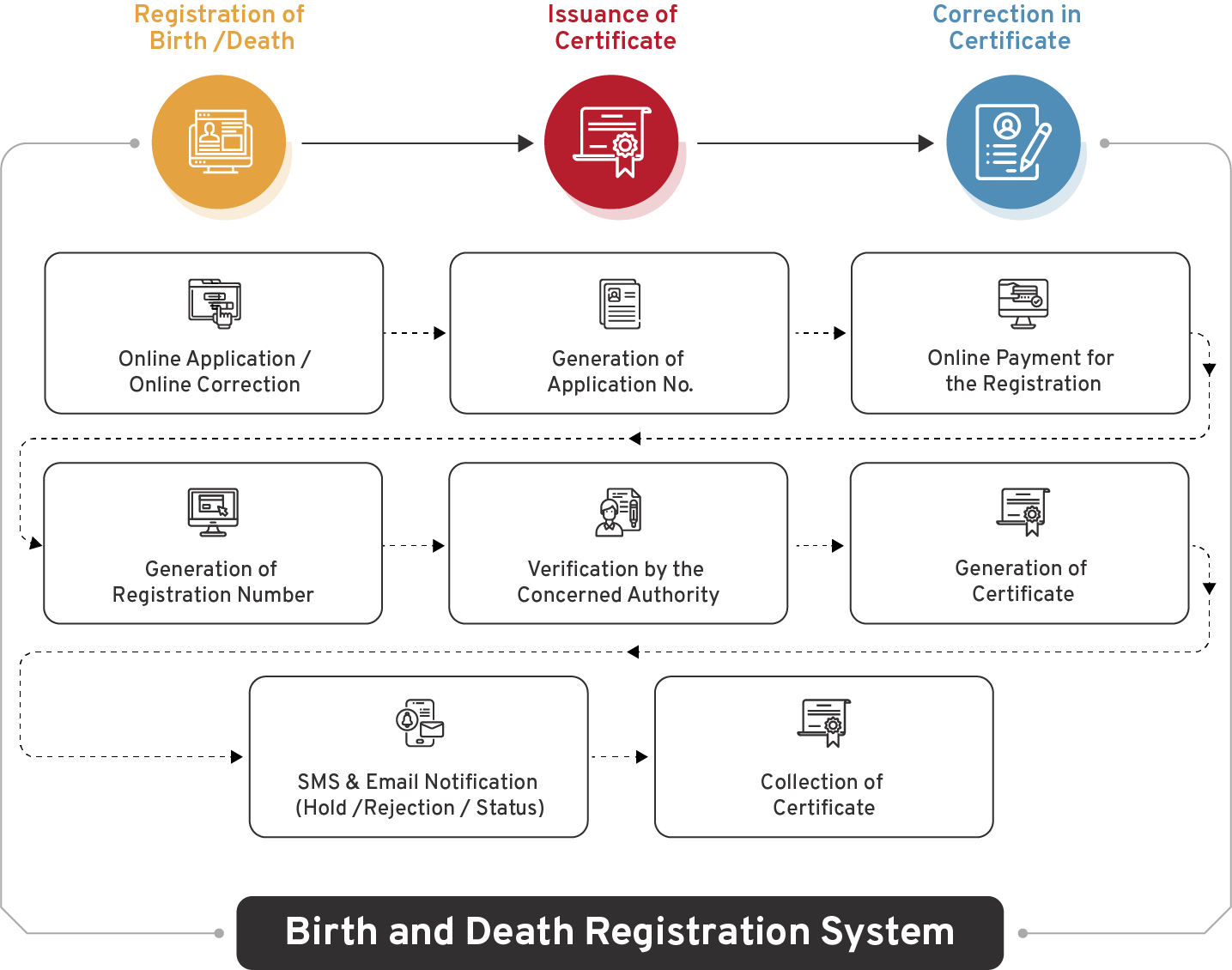Civil registration is the system by which a government records the vital events (births and deaths) of its citizens and residents. It is defined as continuous, permanent, compulsory recording of the occurrence and characteristics of vital events as mentioned & provided through decree or regulation in accordance with the legal requirements of a country. The system provides the individual with a unique identity (her/his name), records parental relationships and provides a statement of place of birth of the child and usually of one or both parents, which are basic grounds on which nationality may be established, depending on laws of each country.
The birth registration record is generally required for establishing proof of age for school entry, employment, obtaining a driving license, entering into legal contracts, marriage etc. The death registration record is generally required for settlement of inheritance, insurance claims, claiming family allowances and other social security benefits. Both are the means to safeguard social status of an individual.
Civil registration is a fundamental function of national governments. These statistics can be used for measuring population change on an annual basis, which otherwise cannot be obtained from Censuses. Among other demographic uses of vital statistics are study of fertility, mortality and construction of life tables and can be extensively used in medical research and in epidemiological and genetic studies too. Vital statistics are invaluable for planning, monitoring and evaluating various programmes such as those dealing with primary health care, social security, family planning, maternal and child health, nutrition, education, education, public housing and so forth.
Despite the well-documented benefits of civil registration, many countries do not have adequate systems in place. The births of tens of millions of children are known to be unregistered every year, and it is estimated that two-thirds of deaths are never registered and are thus not counted in the vital statistics system. Over 110 low- and middle-income countries have deficient civil registration and vital statistics (CRVS) systems.
Complete coverage, accuracy and timeliness of civil registration are essential to ensure the quality of vital statistics. The technological intervention plays a vital role in process reengineering through automation of the system that can ensure efficiency in recording, storage, retrieval, indexing, record searches, corrections, or certifications with much speed, transparency & ease.
CMS’s birth and death registration system enables easy online application, registration and certification while also facilitating corrections in it. The web enabled end-to- end process promotes citizens to register their vital statistics from the convenience of their home with minimum physical visits to the offices and long waiting time for receiving their certificates.
Modules:
Birth/Death Registration
-
Online application of birth /death certificate with all supporting documents by the citizen and request for certificate
-
Application number is generated for reference
-
Online payment for the registration, calculated according to the date of application (> 21 days, > 21 days & < = 30, > 30 days & <=365 Days). There is option for offline payment though challan generation too.
-
Generation of Registration number
-
Verification of the application by the concerned authority of the department
-
Certificate is generated for print after approval. In case of rejection or hold, the same is intimated to the citizen with remarks through sms & email notification.
Issue of Birth/Death Certificate
-
Search by certificate or registration number and request for number of copies
-
If applying for the first copy then need to make the online payment or offline challan
-
Verification of the challan and generation of application number and request for the number of print copies of certificates
-
If not first copy, certificate charges are calculated for each print copy
-
Intimation to the citizen about the issue of certificates through SMS and email notification
-
Collection of certificates from issue counter
Birth/Death Registration Correction
-
Search previous application with its number
-
Check for the status – ‘ on hold’ or ‘ correction’
-
Open previous application and make correction in the application and upload revised documents
-
Verification by concern authority and generation of application number
-
Online payment or offline challan for certificate made by the citizen
-
Verification of challan and generation of registration number for issue of certificate
-
Intimation to the citizens about the status of issue of certificate through sms & email notification

































